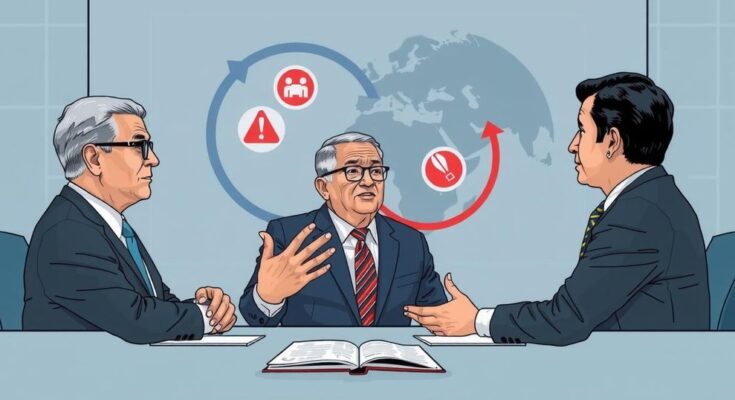Nigerian President Bola Tinubu declared a state of emergency in Rivers State, suspending its governor and elected officials. This decision cites rising security threats due to militant activities. Tinubu’s proclamation raises legal questions about presidential authority, echoing historical declarations made by former presidents Obasanjo and Jonathan under similar circumstances since 1999. The necessity for immediate governmental actions amidst escalating violence is juxtaposed against concerns regarding constitutional boundaries.
Nigerian President Bola Tinubu has declared a state of emergency in Rivers State, effectively suspending its governor, deputy, and all elected assembly members. This action aligns him with former presidents Olusegun Obasanjo and Goodluck Jonathan, who also invoked similar measures following their respective security concerns since the restoration of democratic governance in 1999. The governor’s suspension follows militant activities, including recent attacks on pipelines, which Tinubu cited as necessitating immediate government intervention to maintain order.
In a live broadcast, President Tinubu highlighted the alarming security developments in Rivers, emphasizing that failure to address these issues could result in widespread chaos. He remarked, “With all these and many more, no good and responsible president will stand by and allow the grave situation to continue without taking remedial steps prescribed by the Constitution to address the situation in the state.” To oversee the state during this period, retired Vice Admiral Ibokette Ibas has been appointed as the administrator for six months.
The declaration, enacted under Section 305(5) of the Nigerian Constitution, is meant to address situations classified as “national danger, disaster or terrorist attacks.” Such a declaration enables the president to create regulations aimed at ensuring public safety. Despite having constitutional authority to declare emergencies, many legal experts argue that Tinubu overstepped his bounds by suspending elected officials, a measure which, according to legal commentary, lacks explicit constitutional support.
Historically, Tinubu joins a small group of Nigerian leaders who have declared emergencies. Obasanjo’s administration instituted emergency rule in Plateau State during a severe crisis in 2004, while also implementing similar actions in Ekiti State in 2006. Conversely, Jonathan declared states of emergency in various regions during conflicts with Boko Haram but maintained elected officials in place. This history indicates complex dynamics in Nigeria’s governance during crises, highlighting differing approaches in addressing challenges such as political instability and insurgency.
Overall, President Tinubu’s declaration of a state of emergency in Rivers State underscores the challenge of maintaining governance and security in Nigeria amidst rising threats. His actions, while aimed at restoring order, prompt a legal debate on the limits of presidential powers in such emergencies and may set significant precedents for future governance actions. The vital need for balance between emergency measures and constitutional adherence remains paramount as Nigeria navigates these turbulent times.
President Bola Tinubu’s recent declaration of a state of emergency in Rivers State marks a significant moment in Nigerian governance, reflecting ongoing security challenges. His decision to suspend elected officials has sparked legal controversies, echoing historical precedents set by past presidents during crises. The necessity for strong governmental response against militancy and insecurity is evident, yet the implications for constitutional authority and democratic processes must be carefully examined. Thus, this situation presents both an urgent need for action and a complex legal landscape for Nigerian leadership.
Original Source: www.premiumtimesng.com




